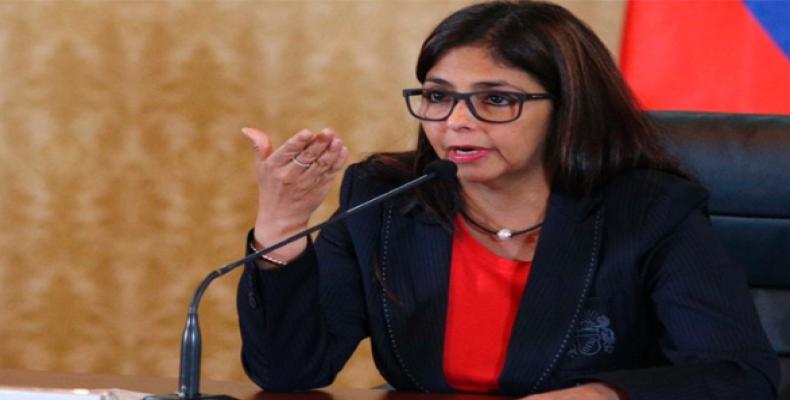Caracas, April 27 (RHC)-- Venezuelan Foreign Minister Delcy Rodriguez has announced that her country will begin the process of exiting the Organization of American States. The move comes after the organization's Permanent Council agreed Wednesday to convene a meeting of foreign ministers to discuss Venezuela -- with 19 votes in favor, 10 against, one abstention and one absence.
Venezuela's top diplomat asserted that the OAS seeks to criminalize the Venezuelan government and destabilize constitutional democracy, in order to facilitate foreign intervention. She said that President Nicolas Maduro will present a letter to the OAS stating that "Venezuela will not participate in any activities that promote interventionism," adding that the exit process will take 24 months.
President Nicolas Maduro reacted to the OAS action on his Twitter account, saying: "The Venezuela Bolivarian Revolutionary and Chavistas will continue their march toward our true independence and nothing and no one will stop us."
Delcy Rodriguez also thanked sister nations for standing with the Bolivarian Revolution, adding that on May 2nd, Venezuela will be represented in San Salvador at a meeting of Community of Latin American and Caribbean States, CELAC, to denounce the interventionism of the OAS in perpetuating imperialist interests.
Samuel Moncada, Venezuela's representative to the Organization of American States, said that the fate of the South American nation will never be decided by institutions such as the OAS or Washington.
Moncada affirmed that Venezuela is an independent nation and will never accept the tutelage of any country. Moncada reiterated to the right-wing governments that attack Venezuela from the OAS that "forced aid is not aid, it is an imposition," referring to the pressures to accept intervention in their internal affairs.
OAS Secretary-General Luis Almagro, who has repeatedly attacked the government of Venezuela, calling for the Democratic Charter to be applied against the country that would lead to its suspension from the organization, has attracted criticism over the past year for his fixation on Venezuela.
Uruguay's President Tabare Vazquez reiterated Wednesday his decision to not support the application of the Democratic Charter against Venezuela, in order to avoid the "radicalization" of the situation.
During a press conference with his Spanish counterpart Mariano Rajoy, the Uruguayan head of state said that "Venezuela's problems must be solved by the Venezuelans themselves. We must extend a helping hand to the Venezuelan people."
Former presidents Martin Torrijos of Panama, Leonel Fernandez from the Dominican Republic, Jose Luis Rodriguez Zapatero of Spain and Colombian Ernesto Samper released a statement denouncing the violence in Venezuela and calling for a peaceful solution to differences.
"The use of violence as a political tool, whatever its origin or motive, is condemnable from any point of view," the statement said.
The Community of Latin American and Caribbean States, CELAC, will hold an urgent session on May 2 about ongoing opposition violence in Venezuela.
The meeting, which is set to be held in San Salvador, was requested by Venezuelan Foreign Minister Delcy Rodriguez. According to the diplomat, the CELAC meeting will address "threats against the constitutional order in Venezuela, as well as the interventionist actions undermining its independence, sovereignty and its right to self-determination."
Article 143 of the OAS Charter states that any member state can choose to leave the group by means of a written communication to the secretary-general and after two years from the date on which the general-secretary receives the notification, the state shall be removed from the organization.


